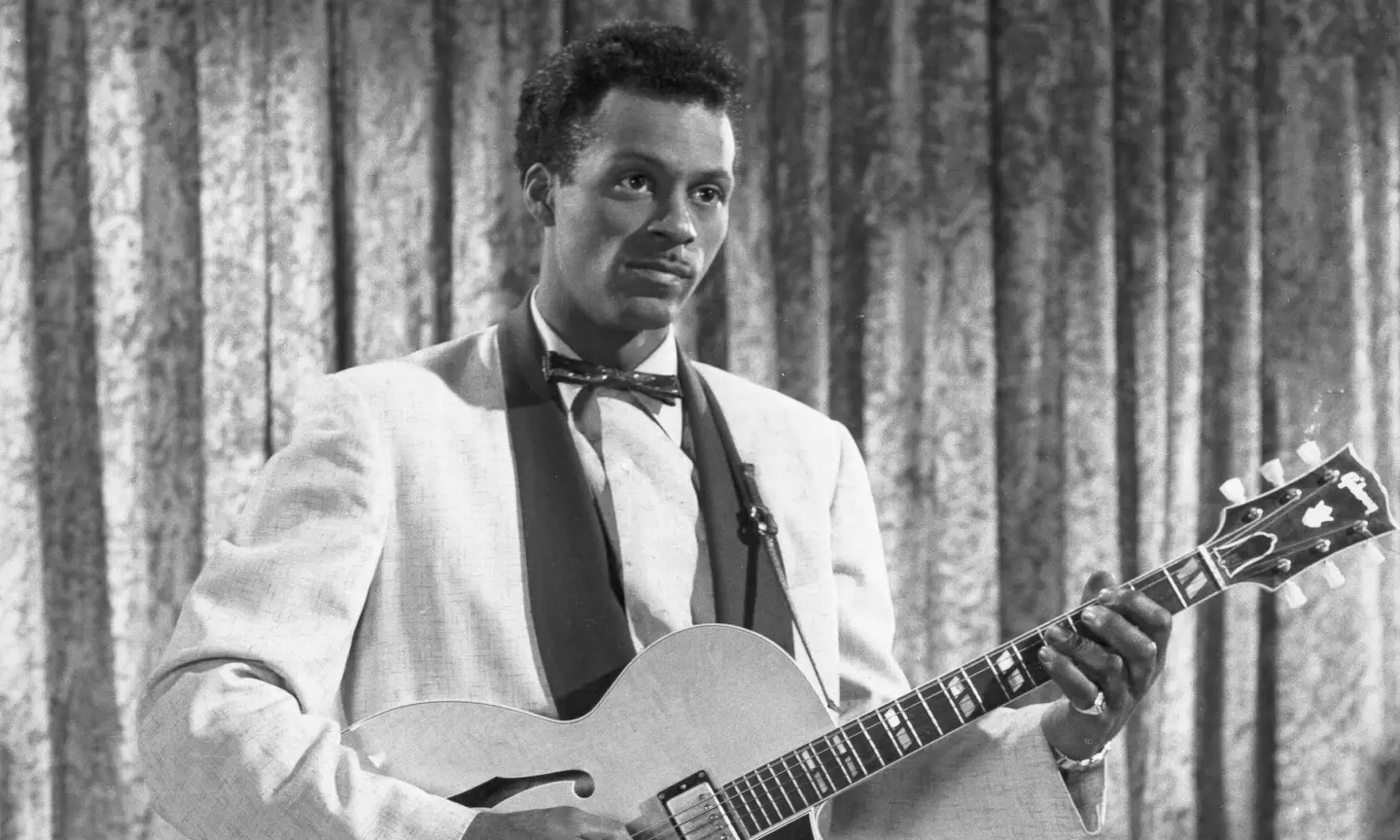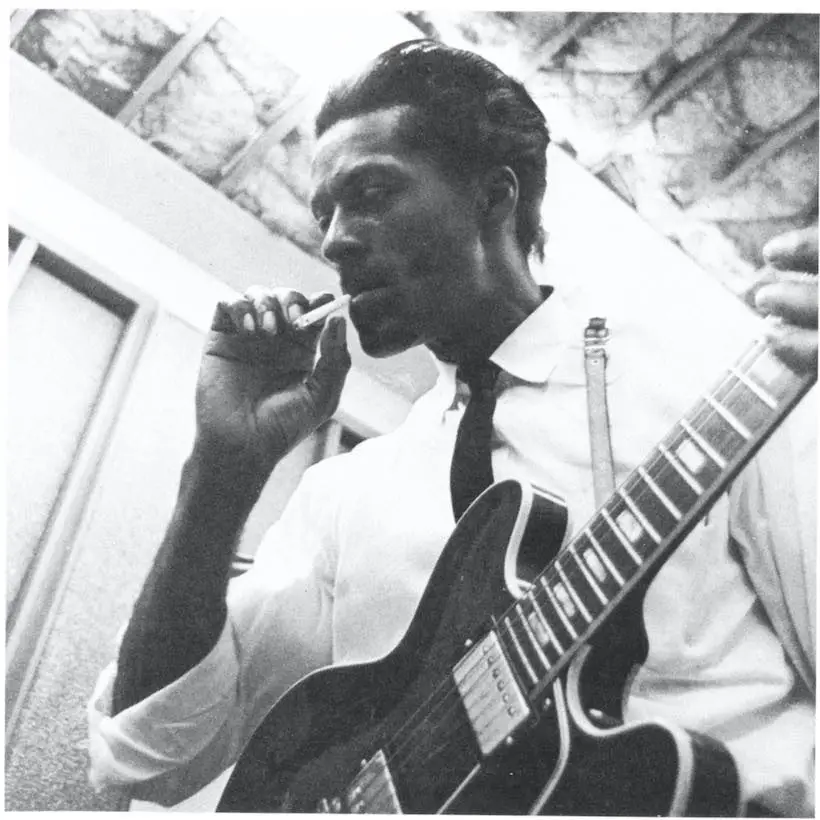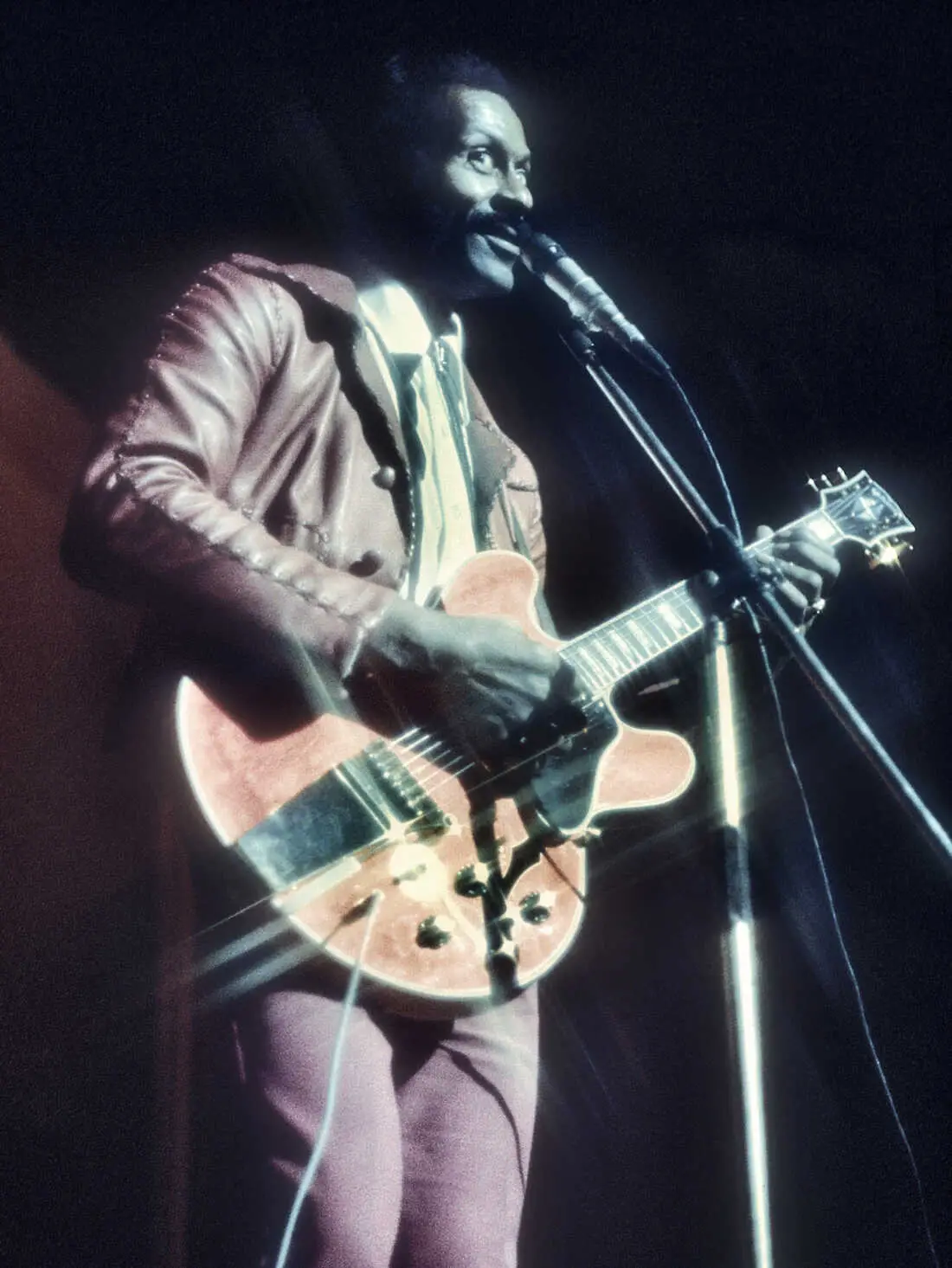The Legendary Chuck Berry A Pioneer of Rock and Roll

Chuck Berry, From Elvis Presley to The Beatles, rock and roll has seen numerous influential artists who have shaped the genre into what it is today. But one name that often stands out as a pioneer and innovator of rock and roll is none other than Chuck Berry.

With his energetic performances, unique guitar style, and timeless hits, Berry left an indelible mark on the music world and became one of the most recognized figures in rock and roll history. In this blog post, we will delve into the life and career of Chuck Berry, exploring his musical style, successes, controversies, and legacy.
Early Life and Career Chuck Berry
Charles Edward Anderson Berry was born on October 18, 1926, in St. Louis, Missouri. He grew up in a lower-middle-class African American neighborhood and was raised by his parents, Martha and Henry Berry. From a young age, Berry showed an interest in music, first picking up the guitar at the age of 13 and performing at his high school talent show.
After finishing high school, Berry worked various odd jobs, including factory work and janitorial work, while also pursuing his passion for music. In 1952, he formed a trio with Johnnie Johnson on the piano and Ebby Hardy on drums, and they began playing at local clubs. It was during one of these shows that Berry caught the attention of Muddy Waters, who introduced him to Leonard Chess of Chess Records.

Musical Style and Influences Chuck Berry
Berry’s musical style was heavily influenced by a variety of genres, including blues, country, and RB. His guitar playing technique, which combined elements of blues and country, became known as the “Chuck Berry style” and inspired countless musicians, including Keith Richards of The Rolling Stones.
One of Berry’s biggest influences was T-Bone Walker, a blues guitarist known for his smooth, jazzy style. Berry incorporated Walker’s signature bend and string raking techniques into his own playing, adding a unique flair to his sound. Other notable influences include Louis Jordan, Nat King Cole, and Muddy Waters.

In addition to his musical influences, Berry also drew inspiration from his personal experiences and observations of the world around him. Many of his songs were based on teenage life, including school, romance, and cars, which resonated with young audiences and made him one of the first rock and roll songwriters to focus on the youth market.
The Rise of Chuck Berry in 1955 A Look Back at His Impact on Rock and Roll
Hits and Successes
In 1955, Berry released his first single, “Maybellene,” which became an instant hit, reaching number one on the Billboard RB chart and number five on the pop chart. This was followed by numerous other hits, including “Roll Over Beethoven,” “Johnny B. Goode,” “Sweet Little Sixteen,” and “Rock and Roll Music.” His songs were not only popular in the United States but also gained international success, making him one of the first African American artists to achieve crossover success in the music industry.

walk and dynamic stage presence captivating audiences. He became known for his high-energy shows, often performing with his trademark Gibson guitar, nicknamed “Maybellene.”
Controversies and Legal Issues Chuck Berry
Despite his success, Berry faced several controversies and legal issues throughout his career. In 1959, he was arrested under the Mann Act for allegedly transporting a 14-year-old girl across state lines for immoral purposes. He was sentenced to three years in prison, but the conviction was eventually overturned due to evidence tampering and prosecutorial misconduct.
In 1979, Berry served four months in jail for tax evasion, and in 1990, he was sued for videotaping women in the bathroom of his restaurant in Missouri. Despite these controversies, Berry’s music and influence on rock and roll remained unchanged.

Later Years and Legacy
In the 1980s and 1990s, Berry continued to perform and record new music, but he also faced health issues and had to undergo heart surgery. He was inducted into the Rock and Roll Hall of Fame in 1986, and in 2000, he received a Grammy Lifetime Achievement Award. In 2017, at the age of 90, Chuck Berry passed away, leaving behind a legacy that continues to inspire musicians and fans alike.
Impact on Rock and Roll
Chuck Berry’s impact on rock and roll cannot be overstated. His music, which blended elements of blues, country, and RB, laid the foundation for the genre and influenced countless artists, including The Beatles, The Rolling Stones, and Jimi Hendrix. His lyrics, which focused on teenage life and youth culture, resonated with listeners and gave a voice to a generation.

Berry’s live performances were also hugely influential, setting the standard for high-energy, dynamic shows that became synonymous with rock and roll. His guitar playing style and stage presence inspired generations of musicians and continue to be emulated to this day.
Collaborations and Relationships
Throughout his career, Berry collaborated with many notable musicians, including Little Richard, Bo Diddley, and Jerry Lee Lewis. He also had a close relationship with John Lennon of The Beatles, who covered Berry’s songs and cited him as one of their biggest influences. In fact, The Beatles’ first single, “Love Me Do,” was heavily inspired by Berry’s “I Got To Find My Baby.”
Although Berry had a reputation for being difficult to work with, his collaborations with other musicians often resulted in some of his most iconic hits. For example, “Johnny B. Goode” was a collaboration between Berry and his bandmate, Johnnie Johnson. Berry also worked with Chuck Leavell, who went on to become the keyboardist for The Allman Brothers Band and The Rolling Stones.

Innovations and Contributions to Music
Chuck Berry’s contributions to music go beyond his iconic songs and performances. He was one of the first artists to use guitar intros in his songs, a technique that became a staple in rock and roll. He also popularized the practice of recording live albums, which gave audiences a taste of what his energetic shows were like.
Berry’s lyrics and storytelling abilities were also ahead of their time, with many of his songs featuring detailed narratives and clever wordplay. His impact on songwriting was so significant that he was awarded the PEN award for literary excellence in 2012.
Rock and Roll All Night Living Your Best Life
Awards and Honors
Throughout his career, Chuck Berry received numerous awards and honors for his contributions to music. In addition to being inducted into the Rock and Roll Hall of Fame and receiving a Grammy Lifetime Achievement Award, Berry was also awarded a Kennedy Center Honor in 2000. He also received the American Music Masters award from the Rock and Roll Hall of Fame in 2012 and was posthumously honored with the Polar Music Prize in 2014.
Discography and Notable Songs
Chuck Berry released over 20 studio albums and countless singles throughout his career. Some of his most notable songs include “Maybellene,” “Roll Over Beethoven,” “Johnny B. Goode,” “Sweet Little Sixteen,” and “Rock and Roll Music.” His albums, such as “Chuck Berry Is on Top” and “The Great Twenty-Eight,” are considered classics and continue to be influential in the rock and roll genre.
| Album Title | Release Year |
|---|---|
| After School Session | 1957 |
| One Dozen Berrys | 1958 |
| Berry Is on Top | 1959 |
| Rockin’ at the Hops | 1960 |
| New Juke-Box Hits | 1961 |
| Chuck Berry Twist | 1962 |
Conclusion
Chuck Berry’s impact on rock and roll is immeasurable. With his energetic performances, unique guitar playing style, and relatable lyrics, he became one of the most influential artists in the genre and laid the foundation for future generations of musicians. Despite facing controversies and legal issues, Berry’s music and legacy continue to inspire and entertain audiences around the world. From his early hits to his later recordings, Chuck Berry’s music will always hold a special place in the history of rock and roll.

